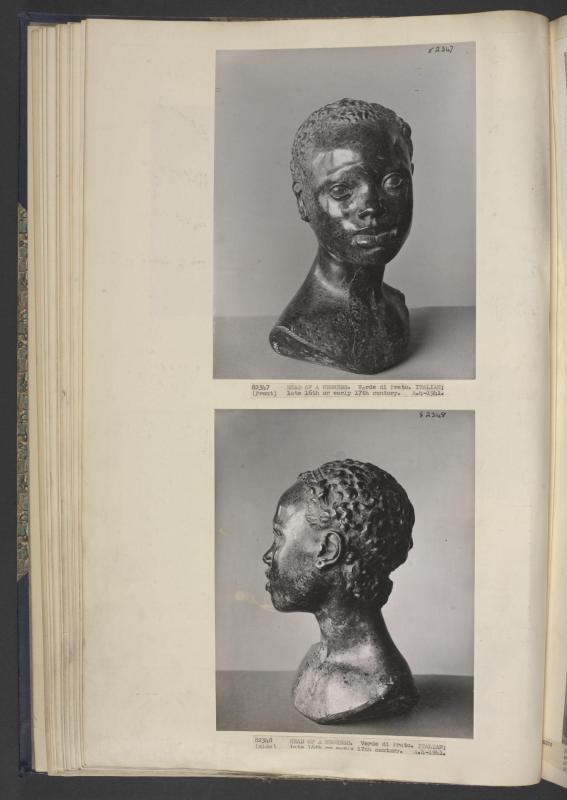Serpentine Bust of a Black Woman
Entry ID
-
43 (13/01/2022)
Formal title of the work
-
Serpentine Bust of a Black Woman
Description of the sculpture
-
Italian sculpture of a figure, probably dating from the sixteenth century. The earlobes have holes for earrings and the headband has traces of gilding. There is some debate over the gender of the bust as both African males and females were depicted wearing earrings and headbands.
URLs where this is recorded/available
Type of object
-
Bust – Portrait
Base
-
Base present - may be a later replacement
Dimensions
-
Height (with base): 40 cm
-
Width: ? cm
-
Depth: ? cm
Materials
-
Serpentine
-
Gold
Specific techniques used
-
Carving
-
Gilding
Overall colour
-
Monochrome – black
Does the Black person have a specific identity?
-
Anonymous: specific individual but not currently identifiable
Role within sculpture
-
Main protagonist
Gender
-
Uncertain
Age
-
Adult
-
Adolescent
Status
-
Uncertain
Clothing
-
No clothes included (head)
Evidence of enslavement
-
None
Evidence of 'exotic' status
-
Earrings (often a single pearl)
Action or activity
-
Not relevant (head)
Emotional state
-
Calm
-
Neutral/emotionless
Focus of gaze of Black person
-
Unfocussed/blank eyeballs
-
Looking sideways
Sculptural context
-
No location included/implied
Place of production
Period of production
-
Sixteenth century (1500-1599)
Date inferred from
-
Inferred from stylistic features
Original purpose
-
Decorative
Original display setting
-
Unknown
Current owner
Current / most recently known location
Accession number
-
A.4-1941
Notes
-
Although the bust is currently called 'Bust of a Black Woman', there is some debate over whether the head represents an adolescent boy or girl. The carving is sensitive and high quality; the headband has traces of gilding, and the holes in the earlobes make it likely that the head was originally adorned with earrings. The date and attribution of this sculpture are still a matter of debate. It was once thought to be after Giambologna and has been variously dated to the 16th or 18th century. The lower edge of the bust is curved and bevelled, suggesting that it was originally set in a bronze or marble base.
Current rights holder
‘Serpentine Bust of a Black Woman’ (no date), Black People in European Sculpture, accessed May 5, 2025, http://13.41.147.145/s/database/item/416












